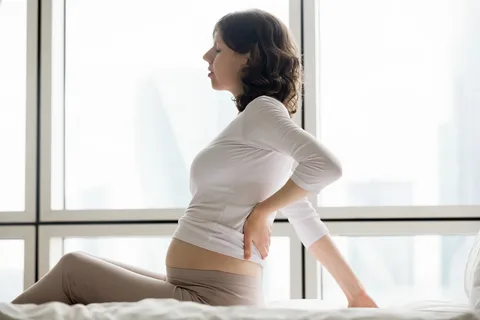Most women during pregnancy are prone to feel pain in the upper back due to many changes they face during this whole period. Even, this becomes difficult for women to perform daily simple tasks like getting dressed, picking up groceries, or movement. Mostly, women face upper back pain pregnancy during the second and third trimesters.
The problem increases with the passage of time as the body weight also starts increasing. So, before facing any serious complications it is advisable to visit a best pain doctor in Dallas.
Symptoms of Back Pain During Pregnancy
A woman during pregnancy is at risk to face a lot of problems. Some of the signs and symptoms are as follows.
- Back pain in the middle
- Anxiety or pain above or below the waistline
- Inflammation of the pubic bone
- Thigh or buttock pain
- Leg pain radiating from the back
- Long periods of sitting or standing may cause stiffness or discomfort
Causes of Upper Back Pain During Pregnancy
According to pain clinic Kaufman, following causes can lead to upper back pain pregnancy.
-
Increase of Hormones
During pregnancy, hormonal changes cause the ligaments in the pelvic region to soften and the joints to become more flexible in preparation for childbirth. While this process is essential for delivery, it can also reduce the natural support provided to the spine and lower back. Over time, this strain can lead to stiffness, discomfort, and persistent back pain.
-
Center of Gravity
-
Additional Weight
As your pregnancy advances and your baby continues to grow, your back must support an increasing amount of weight. This added pressure can strain the muscles and ligaments of your spine, often leading to discomfort, stiffness, or pain, especially in the lower and upper back areas.
-
Posture or Position
Frequent bending, poor posture, and prolonged standing are common factors that can contribute to upper back pain pregnancy. As the baby grows, the added weight shifts the mother’s center of gravity, causing increased pressure on the spine and back muscles.
-
Stress
The body tends to hold stress in its weaker areas. During pregnancy, hormonal and physical changes in the pelvis can make it more vulnerable, and periods of emotional or physical stress may intensify back pain as the body adjusts to these changes.
When to Contact Your Doctor
Upper back pain is a normal part of pregnancy, but you should know when something is wrong. If you experience any of the following symptoms, you should consult your physician:
- Labor-like symptoms are present in you In addition to back pain, you may also experience vaginal bleeding and leakage of fluid
- Urinating frequently causes a burning sensation.
- An infection of the urinary tract could be the cause of this.
- There has been no improvement in your back pain despite two weeks of treatment
- Symptoms include tingling and loss of sensation in the extremities. Spinal nerve problems may be the cause of this.
Treatment for Early Back Pain During Pregnancy
Any stage of pregnancy can be affected by back pain. Although the pain cannot be completely prevented, it can be minimized. Follow these tips to reduce back pain in pregnant women.
- Always try to balance yourself using a healthy posture whether you are standing or sitting.
- Never stand for a longer period of time.
- Always confirm that the chest is elevated and shoulders are relaxed.
- Squat instead of bending your waist if you need to pick something up.
- Do not lift anything that is heavy.
- Ensure that your shoes are comfortable and supportive.
- Sleep on your side, not on your back, and place pillows between your knees and beneath your belly to provide gentle support.
- Strengthen and support your back and abdomen through pregnancy-safe exercises.
- Discover how chiropractic adjustments can assist in relieving back pain during pregnancy by conducting a search for chiropractors who specialize in pregnancy-related care.
- When seated, elevate your feet and ensure that the chair provides comfortable back support. For additional back support, you might want to consider using a lumbar pillow.
- Ensure that you get enough sleep.
- Extra rest, meditation, and prenatal yoga are very effective in managing stress levels, if upper back pain pregnancy is due to stress.
- A prenatal massage can be incredibly soothing and relaxing, and ice packs can be used to relieve back pain.
Best Stretches for Pregnant Women
There are many benefits to practicing prenatal yoga during pregnancy, including the prevention and relief of back pain. Can’t attend a class? Anand recommends trying these simple stretches.
-
Cat Stretch
-
- On your hands and knees, gradually round out your back while pulling in your stomach.
- You should perform 10 repetitions of this position holding it for at least 10 to 20 seconds at a time, depending on your comfort level.
-
Fitness Ball Stretch
-
- A fitness ball should be placed at the back of your head as you sit on the floor.
- As you lean your back against the ball, your knees should be bent, your feet should be flat on the floor, and your hands should be placed on your hips with your elbows out.
- Hold the fitness ball at the small of your back for a period of 10 to 20 seconds before returning to your starting position. Perform 10 repetitions.
-
Standing Pelvic Tilt
- Stand straight against a wall with your feet shoulder-width apart while placing the small of your back against the wall.
- Your lower back muscles can be stretched and strengthened by doing ten repetitions at a time.
Summary
Pregnancy brings a lot of changes in women, so women should never ignore any indication related to pain in any part of the body. But mostly women feel upper back pain due to excess weight and other conditions. It is always recommended to be linked with the doctor from the first trimester to last one.


